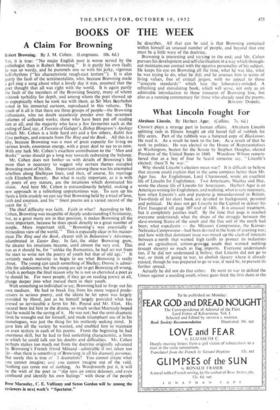BOOKS OF THE WEEK
A Claim For Browning
Robert Browning. By J. M. Cohen. (Longman. 10s. 6d.)
YES, it is true: "No major English poet is worse served by the anthologist than is Robert. Browning." It is partly his own fault; he was so wordy, and lie pummels one so with his jerky, vigorous half-rhythms ("his characteristic rough-cast texture"). It is also partly the fault of the sentimentalists, who, because Browning made a girl sing a song about what a lovely day it was, assumed that the poet thought that all was right with the world. It is again partly the fault of the members of the Browning Society, many of whom mistook turbidity for depth, and among whom the poet showed up so eupeptically when he took tea with them, as Sir Max Beerbohm noted in his immortal cartoon, reproduced in this volume. The result of it all is that there are three groups of people—the Browning enthusiasts, who no doubt ceaselessly ponder over the seventeen volumes of collected works; those who have been put off reading him at all; and the majority who have a few favourites such as the ending of Saul, say, A Toccata of Galuppi's, Bishop Blougram's Apology (which Mr. Cohen is a little hard on) and a few others, Rabbi ben Ezra perhaps, and extracts from The Ring and the Book. All this is a pity, because Browning was a man of great capacity for living on various levels, enormous energy, with a great deal to say to us now. With any luck Mr. Cohen's excellent contribution to the " Men and Books" series should go a long way towards redressing the balance.
Mr. Cohen does not bother-us with details of Browning's life more than is necessary to suggest why certain themes occupied Browning most of his life. Important among these was his attempted rebellion along Shelleyan lines, and then, of course, his marriage with Elizabeth Barrett. But what is really important, as it is with all poets of any stature, are the intuitions which dominated his vision. And here Mr. Cohen is extraordinarily helpful, making a new approach in a refreshing unpretentious way. To sum up his thesis a little crudely we can say that Browning held by a triad of love, faith and creation, and his " finest poems are a varied record of the quest for it."
The chief difficulty was faith. Faith in what? According to Mr. Cohen, Browning was incapable of deeply understanding Christianity, but, as a great many are in that position, it makes Browning all the more important, because he does speak directly to a great number of people. More important still, "Browning's was essentially a miraculous view of the world." This is especially clear in his master- piece The Ring and the Book, clearer still in Balaustion's Adventure, adumbrated in Easter Day. In fact, the older Browning grew, the clearer his intuitions became, until almost the very end. This was as it should be, for "unlike the Romantics, he had set out from the start to write not the poetry of youth but that of old age." It certainly needs maturity to begin to see what Browning is really about. The young can catch something of Shelley; Donne is admir- able for adolescents; but the young are apt to get Browning all wrong, which is perhaps the final reason why he is not so cherished a poet as he should be. For most people, if they go on reading poetry at all, plunge deeper into what moved them in their youth.
With something so individual to say, Browning had to forge out his own medium. He had to break free from his more vogued prede- cessors in serious poetry, and the idiom he hit upon was largely provided by Hood, just as he himself largely provided what has proved so ,serviceable a form for Mr. Pound and Mr. Eliot. His natural bent led him to the drama, so much so that Macready hoped that he would be the saving of it. He was not; but the semi-dramatic form he wrought out for himself, and made triumphant use of in his monologues, was just the thing for his restlessly seeking mind. It gave him all the variety he wanted, and enabled him to maintain an even texfute in each of his poems. From the beginning he had enormous skill, but he had to find something characteristic, a form in which he could talk out his doubts and difficulties. Mr. Cohen perhaps makes too much out from the doctrine originally advanced by Browning's French friend Milsand—admirable if not, taken too tar—that there is something of Browning in all his dramatis personae. But surely this is true of ll dramatists? You cannot create what you cannot imagine; and you cannot imagine out of the void. Nothing can come out of nothing. As Wordsworth put it, it will be the wish of the poet to "slip into an entire delusion, and even confound and identify his own feelings" with those of the people he describes. All that can be said is that Browning contained within himself an unusual number of people, and beyond that one must be a little wary of the doctrine.
Browning is interesting and varying to the end; and Mr. Cohen pursues his development and self-clarification in a way which through- out maintains our contact with the cfeative personality of his subject. He keeps his eye on Browning all the time, what he was like, what he was trying to do, what he did; and he assesses him in terms of living values, free of critical jargon, with no appeal to those -"concrete standards" which lure the laboratory-minded. A refreshing Fid stimulating book, which will serve, not only as an admirable introduction to those innocent of Browning lore, but also as a running commentary for those who already read the poems. BONAMY DOBREE.


































 Previous page
Previous page